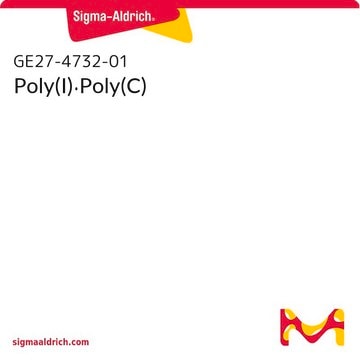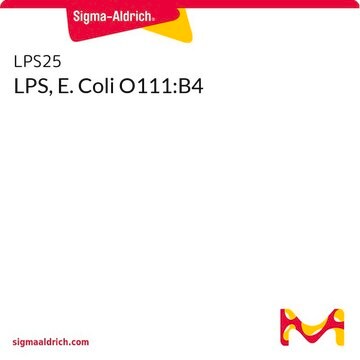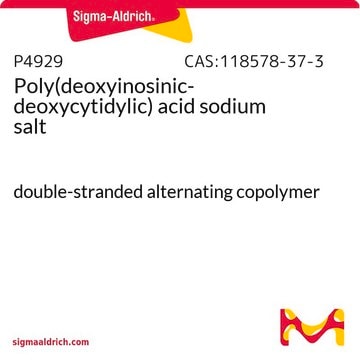528906
Polyinosinic Acid • Polycytidylic Acid, Sodium Salt, Double-Stranded
Known to induce interferon production. Hypochromicity: ≥40% at 248 nm. Extinction coefficient = 5000 M-1cm-1 at 260 nm, pH 7.0.
Sinónimos:
Polyinosinic Acid • Polycytidylic Acid, Sodium Salt, Double-Stranded, Poly I • poly C, Na
Iniciar sesiónpara Ver la Fijación de precios por contrato y de la organización
About This Item
Productos recomendados
Quality Level
assay
≥99% (TLC)
form
powder
manufacturer/tradename
Calbiochem®
storage condition
OK to freeze
color
white
solubility
aqueous buffer: 10 mg/mL
water: soluble
shipped in
ambient
storage temp.
−20°C
General description
Hypochromicity: ≥40% at 248 nm.
Known to induce interferon production.
Application
- Penaeus monodon Interferon Regulatory Factor (PmIRF) Activates IFNs and Antimicrobial Peptide Expression via a STING-Dependent DNA Sensing Pathway.: This study explores the role of PmIRF in shrimp immune responses, specifically how it activates interferons and antimicrobial peptides through the STING-dependent DNA sensing pathway, enhancing antiviral defenses. (Soponpong et al., 2021).
- Identification, expression profiling of a grass carp TLR8 and its inhibition leading to the resistance to reovirus in CIK cells.: This article focuses on the TLR8 receptor in grass carp, its expression profiles, and how its inhibition confers resistance to reovirus in fish cell lines, providing insights into antiviral immunity in aquatic species. (Chen et al., 2013).
- Identification and expression profiles of ADAR1 gene, responsible for RNA editing, in responses to dsRNA and GCRV challenge in grass carp (Ctenopharyngodon idella).: The study examines the ADAR1 gene involved in RNA editing in grass carp, highlighting its response to double-stranded RNA and grass carp reovirus, shedding light on fish immune mechanisms. (Yang et al., 2012).
- Immune activation and target organ damage are consequences of hydrodynamic treatment but not delivery of naked siRNAs in mice.: This research differentiates the effects of hydrodynamic treatment and naked siRNA delivery in mice, showing that immune activation and organ damage are associated with the treatment method rather than the siRNAs themselves. (Rácz et al., 2011).
Warning
Toxicity: Standard Handling (A)
Reconstitution
Following reconstitution, aliquot and freeze (-20°C). Stock solutions are stable for up to 6 months at -20°C.
Legal Information
CALBIOCHEM is a registered trademark of Merck KGaA, Darmstadt, Germany
Storage Class
11 - Combustible Solids
wgk_germany
WGK 3
flash_point_f
Not applicable
flash_point_c
Not applicable
Certificados de análisis (COA)
Busque Certificados de análisis (COA) introduciendo el número de lote del producto. Los números de lote se encuentran en la etiqueta del producto después de las palabras «Lot» o «Batch»
¿Ya tiene este producto?
Encuentre la documentación para los productos que ha comprado recientemente en la Biblioteca de documentos.
Los clientes también vieron
Xiang Chen et al.
Cellular & molecular immunology, 17(1), 76-84 (2018-10-03)
Epigenetic modification, including histone modification, precisely controls target gene expression. The posttranscriptional regulation of the innate signaling-triggered production of inflammatory cytokines and type I interferons has been fully elucidated, whereas the roles of histone modification alteration and epigenetic modifiers in
Nuestro equipo de científicos tiene experiencia en todas las áreas de investigación: Ciencias de la vida, Ciencia de los materiales, Síntesis química, Cromatografía, Analítica y muchas otras.
Póngase en contacto con el Servicio técnico








